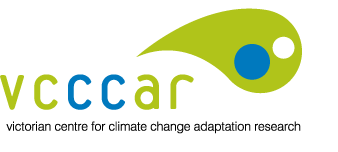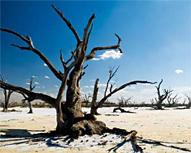Rod Keenan's introductory speech at the 2014 Victorian Adaptation Forum
Welcome to the 2014 VCCCAR Annual Forum.
On the afternoon of Saturday February 7 2009 I sat down in my apartment in Melbourne to write an application for the position of Director of a Climate Change Adaptation Research Centre. The advertisement said that the centre will ‘bring together expertise in social, economic and biophysical science to work together on climate change adaptation research, and provide cross-disciplinary advice to the government and the community in this important public policy area’.
It was 47 degrees that afternoon. The wind roared like a blast furnace through the streets of the city. As a forester, I had considerable fears, but as I wrote the letter I had no real knowledge of the events happening that afternoon in areas to the north and east of Melbourne, events that would change the lives of those communities and the psyche of the Victorian people. The conditions certainly put what I wrote into a strong context.
Looking back, I wrote that I was excited by the possibilities offered by the role and felt that, if managed successfully, the Centre would provide the capacity to build a major new area of science capability in Victoria and deliver the knowledge required for Victorian industries, institutions, communities and families to adapt to the challenge of climate change. To me, it was an important signal that the government had committed to this type of long-term endeavour. We had been through almost 12 years of drought, had experienced the 2003 and 2006-07 bushfires and I felt that we needed to develop a new way of addressing these long-standing environmental and social challenges, focusing more on anticipating and avoiding future problems rather than simply reacting and responding to events as they occur. Australians are generally very good at the latter but less so at the former.
At that time, I knew relatively little about the emerging research area of adaptation but I did have considerable experience of managing research in government and in universities and in being part of partnerships between researchers and policy makers.
Over that five years, the livelihoods, lifestyles and mindsets have continued to be shaped by climate-related events: floods in 2010-11 floods, more fires and heat waves have had significant impacts on agricultural and tourism industries, natural resources, businesses and communities.
In introducing our fifth Annual Forum I felt I would take a lesson from the recently completed ‘Implementing Adaptation’ project and reflect on the following questions:
- “What was new?”
- “What was challenging?”
- “Has your perspective changed?”
- “What will you take away?’
- “What was the most important point to you?”
As a forest ecologist, dealing with new environments, industries, people and approaches to research has been a new and stimulating experience. I’ve engaged with design experts, economists, geographers, social and behaviourial scientists, climate scientists, lawyers and many other types of researchers. It has been a real privilege to work with some of the best people in the country and to develop projects with them that have made a difference to policy and practice.
Working with government is a continuing challenge: dealing with changing policy priorities, restructures and re-assignment of staff, maintaining relationships that are so vital to making the research-policy process work through constant change, and presenting credible information in a timely, useful and relevant way. Encouraging researchers to consider and understand the policy context and how their outputs might be of most use has also been a challenge.
What I take away is that, while there is often a lot of jargon and complex sounding concepts, adaptation doesn’t have to be complicated. It’s about making better decisions using all the information you have in front of you. It’s about thinking longer term and considering wider implications and consequences of events, understanding the nature of the ‘system’ you are operating in. It’s about investing in research to support new knowledge and information or testing approaches that might work better to design new approaches or support better decisions.
Often it involves leaving your expert knowledge at the door and engaging in a genuine discussion about the nature of the problem with a range of interested people and working together on a solution.
Most important for me is that adaptation is about people. Good relationships and mutual understanding are critical to productive conversations about potential solutions. Relationships between agencies, between different levels of government, between researchers and government and between all these people and the communities they serve are all important in anticipating and avoiding the impacts of major shocks or managing the response and recovery process.
So, where have we got to in Victoria over the last 5 years? Through the efforts of those involved with VCCCAR projects, investments under NCCARF, the CSIRO Flagship and the Bureau of Meteorology and many activities in state and local governments and the private sector, a considerable amount has been achieved.
We can point to major improvements in water cycle management and conservation, better use of our urban and rural water resources. Considerable improvement in bushfire institutional arrangements, decision making and response capacity, major leap in understanding and interest in the role of urban green infrastructure, big improvements in heat wave warnings and response capacity, wider understanding of the risk of flooding and issues with flood management and considerable investment to heat proof transport infrastructure and services.
However, in my view, we are still too heavily focused on response. For example, we have a Minister for Bushfire Response not Bushfire Preparedness. Our, ‘she’ll be right, leave it until the last minute, lets deal with that when the time comes approach’ is leading us to spend more than we need to on the responding to events and not enough on planning, preparation and avoidance. Future climate related risks are receiving limited consideration in metropolitan planning and in large new urban developments like Fisherman’s Bend. My personal bug-bear is the Australian Open tennis, where there seems to be little forethought going into the implications of heatwaves on scheduling and players and spectators are setting a poor example, suffering through intolerable conditions and putting themselves at risk when there is no real need.
There is a lot of talk about resilience but we are still not clear what it means or how best to foster it in our interconnected communities and industries.
As we come to the end this first five years of coordinated adaptation research, we can point to considerable achievements. I firmly believe we have made a direct and lasting contribution to considering and avoiding future climate impacts in Victoria and have delivered knowledge for Victorian industries, institutions, communities and families to adapt to the challenge of climate change.
My sincere thanks to everyone involved with VCCCAR for your support, your friendship and your many different contributions over the last 4 years or so. While we are unsure of future research funding, I look forward to the next stage of the journey in adapting well to climate change in Victoria.


